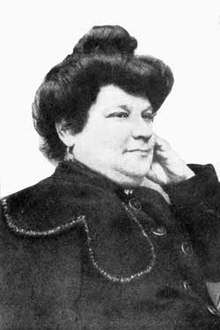Angelina Vidal
Angelina Vidal (1847 – 1917) was a Portuguese writer, editor noted for her support of the republic, women's rights and education for women.
Angelina Vidal | |
|---|---|
 | |
| Born | 1847 São José |
| Died | 1917 Anjos |
| Occupation | writer |
| Nationality | Portugal |
Life
Vidal was born in São José in 1847. Her parents were Joaquim Casimiro Júnior[1] and Rita Adelaide de Jesus. Her father was married to Maria do Carmo Figueiredo and as a result she had a half-sister named Carlota Joaquina da Silva Faria who died in 1913. At the age of nine she was an orphan.[2]
She married in 1872.[1] Her work Death of Satan was published in 1879. After twelve years of her marriage she separated from her husband. Divorce was impossible and her husband gained the custody of their children. In 1886 she published To the Portuguese workers which encouraged workers to campaign for a 12 hour day as at that time the standard working day was 15 hours.[2]
Her husband died in 1894.[1]
In 1901 she faced financial hardship. She had to turn to the charity of tobacco workers. This was not short-term and she had to ask again 1904.[3]
Death and legacy
Vidal died in Anjos.[1] A plaque was placed on her house although it is believed that the date on the plaque is wrong.[4] She was one of the first women in Portugal who were concerned with women's subordinate status and in particular about improving the educational opportunities for Women in Portugal together with Francisca Wood, Alice Pestana, Carolina Michaëlis de Vasconcelos, Alice Moderno, Maria Amália Vaz de Carvalho, Antónia Pusich and Guiomar Torrezão.[5] A street is named for her in Lisbon.[6]
Works
- Death of Satan 1879
- Night of the Spirit 1887
- Icarus 1902
- Jesus in the Temple 1881
- Jessa Helfmann to the Mothers, Lisbon, 1881
- The Marques de Pombal in the light of Philosophy, Lisbon, 1882
- Ultrage. Dedicated to Major de Quillinan , Lisbon, 1883
- Loose Leaves , 1887
- The Provocation. Letter to the King, 1887
- History file. Narrative of the Foundation of Towns and Villages of the Kingdom and its Brasõ es Arms , 1889
- Hatred for England , 1890
- Protest against England 1890
- Justice to the vanquished, 1890
- Liquidating ... Spirals of Pain , Lisbon, 1894
- In the Forests of Life, Lisbon, 1906
- Passion Week, 1906
- Black Tales 1896
- Old Lisbon and Modern Lisbon. Historical Elements of its Evolution , 3 volumes, 1900-1903
- The Red Tales 1904
Crystal Tales 1905
- Gospel of Instruction 1907
- The Crystalline Tales, 1907-1908
- Abederário do Amor, 1908
- Avé Charitas! To the great heart of lus of the illustrious mr. dr. Manuel d'Arriaga , Lisbon, 1912
Private life
She married, Luís Augusto de Campos Vidal, a Navy doctor in 1872. They had five children Julieta Casimiro Vidal (1873-1944), Violet Casimiro Vidal (1874-1916),Antonino Casimiro Vidal (1876-1912), Ema Casimiro Vidal (1879-1884) and Hugo Casimiro Vidal (1886-1940). Her estranged husband died in 1894.[1]
References
- "Angelina Vidal | Escritoras". www.escritoras-em-portugues.eu (in Portuguese). Retrieved 2020-06-11.
- Fcsh +lisboa (2017-04-11). "Angelina Vidal: uma desfavorecida que defendeu os desfavorecidos". FCSH+Lisboa (in Portuguese). Retrieved 2020-06-11.
- "Details view: Angelina Vidal (1853-1917)". debategraph.org. Retrieved 2020-06-11.
- "PT-ADLSB-PRQ-PLSB45-001-B19_m0447.TIF - Livro de registo de baptismos - Arquivo Nacional da Torre do Tombo - DigitArq". digitarq.arquivos.pt. Retrieved 2020-06-11.
- Bermudez, Silvia; Johnson, Roberta (2018-02-05). A New History of Iberian Feminisms. University of Toronto Press. ISBN 978-1-4875-1029-9.
- "Category:Rua Angelina Vidal - Wikimedia Commons". commons.wikimedia.org. Retrieved 2020-06-11.